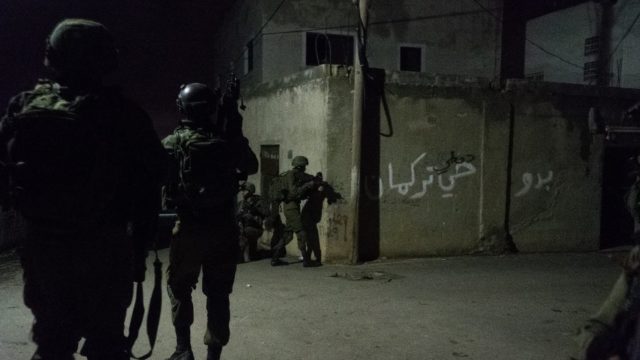
Israel and West Bank
Israeli forces lead a raid in the West Bank village of Yamun on February 6, killing Ahmed Jarrar, the man responsible for the January 9 terrorist attack that claimed the life Rabbi Raziel Shevah. Earlier in the week, Jerusalem retroactively legalized the West Bank outpost of Havat Gilad, where Rabbi Shevah had been living. Prime Minister Benjamin Netanyahu said that cabinet’s unanimous vote was meant to “allow the continuation of normal life there.”
A mob of over 200 Palestinian Arabs attempted to attack an Israeli man who got lost and entered the Palestinian village of Abu Dis in the West Bank. Palestinian police in the area removed the man from his car and secured him inside a nearby building. The mob proceeded to burn the car before IDF forces moved into the village and evacuated the man.
Gaza
The Israeli Defense Ministry announced that it had recently stopped an attempt to smuggle bomb-making supplies into Gaza through the Kerem Shalom crossing on February 4. The contraband supplies were hidden in boxes holding medical supplies and were discovered during a routine inspection.
In anticipation of a future conflict with Israel, Hamas conducted near-daily missile tests including a series of five missile tests on February 3. Israeli aircraft also attacked a Hamas target on February 3 in response to a rocket fired at Israel from the coastal enclave.
Sinai
A roadside bomb in the Sinai killed two members of the Egyptian security forces and wounded five others, including a civilian. No group has taken responsibility yet, but the attack seems to be similar to previous ones carried out by the Islamic State’s Sinai affiliate.
The Egyptian government began removing homes and olive groves in the area around the El-Arish Airport in North Sinai in order to create a security buffer zone, displacing thousands of people. El-Arish has been closed to the public for years but is used by high ranking officials when they travel to North Sinai.
According to a New York Times report, Israel covertly used unmarked drones, helicopters, and jets to attack militant groups in Egypt with the permission of the Egyptian government over the past two years. For Egypt, Israeli assistance has helped it gain the upper hand in a five-year war it has been fighting with radical Islamic groups in Sinai. For Israelis, these strikes help them control their border and ensure that instability in the Sinai Peninsula doesn’t spill over the borders. Both sides desire to conceal Israel’s role in the airstrikes for fear of a backlash inside Egypt, where government officials often refer to Israel as a nemesis and declare their allegiance to the Palestinian side.
Golan Heights
Arabic language news media reported that Hezbollah has bought 100 acres of land in Druze communities near the Chouf Mountains to store weapons, in the hopes that Israel will be reluctant to strike areas near the minority population.
Media reports indicate that Hamas may be seeking to set up a military force in the Golan Heights at the urging of Iran. This force would be directed to fire missiles towards Israel from strategic positions in the North. Hamas hasn’t commented on this report but several sources within Gaza have denied it.
Jewish Policy Center intern Shep Gerszeberg compiled this report.





